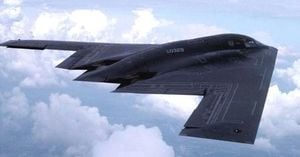U.S. President Donald Trump has signaled his intention to impose significant tariffs on Canadian imports, stating during his inaugural address on January 20, 2025, his plan to enact across-the-board tariffs of up to 25 percent, effective February 1. This announcement has sent ripples of concern throughout Canada, where officials, business leaders, and the public are weighing the potential impacts of such tariffs on the already interconnected economies of the two neighboring countries.
During the signing of executive orders at the White House, Trump expressed his reasoning for the tariffs, linking them to issues of migration and drug smuggling. "We’re thinking in terms of 25 percent on Mexico and Canada because they’re allowing vast numbers of people to come across the border," Trump said. His comments suggested he viewed Canada as problematic, asserting, "Canada’s a very bad abuser." The proposed tariffs are part of Trump’s broader protectionist trade agenda aimed at supporting American workers and families.
While Trump's announcement initially stirred fears among Canadian officials about imminent trade actions, it simultaneously revealed relief as business leaders noted the lack of immediate enforcement. "Let’s call it what it is, which is a time out," remarked Goldy Hyder, chief executive of the Business Council of Canada, indicating optimism but cautioning against complacency.
Finance Minister Dominic LeBlanc addressed the potential tariffs, stating, "None of this should be surprising, the one thing we’ve learned is President Trump at moments can be unpredictable." LeBlanc underscored Canada's readiness to implement countermeasures should the tariffs be enforced, stressing the importance of preparedness as trade negotiations continue to evolve.
Trade Minister Mary Ng echoed LeBlanc’s sentiments, reassuring Canadians of the government's proactive approach, declaring, "We are ready and we are prepared." Canadian officials have been preparing for various scenarios, including the possible implementation of tariffs amounting to $37 billion on American goods, should Trump follow through with his threats.
Many economists and industry leaders sounded alarms over the potential economic consequences of such tariffs. Early estimates predict harms to Canada’s economy, estimating as much as 2.6 percent reduction to its GDP and 1.6 percent cut to the U.S. GDP as fallout from the introduction of tariffs. Catherine Fortin-LeFaivre of the Canadian Chamber of Commerce highlighted the uncertainty such threats create for businesses, stating, "The day is not done yet and there is always tomorrow," as she called for vigilance within the Canadian business community.
The political ramifications of Trump’s threats have galvanized leaders across Canada. Prime Minister Justin Trudeau has consistently emphasized Canada’s readiness to respond firmly should tariffs materialize. Following meetings with provincial leaders, Trudeau stated, "We are strongest when we work together," aiming to solidify political unity against the tariff threats.
Quebec Premier François Legault remained cautious but realistic, saying, "I'm not saying we won and it's over with Mr. Trump. It may happen tomorrow morning." This sentiment echoed through the political discourse within Canada, where legislators are now acutely aware of the unpredictability of Trump's administration.
Alberta Premier Danielle Smith expressed concern over possible retaliatory measures being discussed and urged for diplomacy rather than retaliatory tariffs. Smith's views reflect the divided sentiments among Canadian provinces, with some leaders advocating for stronger counteractions against any imposed tariffs.
Leaders such as Ontario's Doug Ford cautioned against portraying the pause on tariffs as permanent reassurance. Ford remarked, "He’s just adding more uncertainty, saying, ‘I may not do it today, I’ll do it tomorrow.’ That doesn’t help.”
Despite the prevailing concerns, some Canadian officials are optimistic about establishing constructive relations with the Biden administration. They are hoping the apprehensions surrounding Trump’s threats might lead to more substantial discussions on trade practices and mutual interests, highlighting the deep economic ties shared between the two countries.
Given the importance of the Canada-U.S. trade relationship—which accounted for over $1 trillion in trade last year—the looming tariff threats represent not just economic concern, but also political maneuvering. The potential economic fallout necessitates vigilance from Canadian leaders as they prepare to navigate the intricacies of shifting trade dynamics.
With Trump’s trade protection policies likely to persist, Canada must remain poised for potential tariffs and focused on unity among its political leaders and business communities. The weeks leading up to February 1 will be pivotal as both nations will be watching closely for any developments on this front. Politicians and economists alike stress the importance of strategic diplomacy and consistent communication to mitigate the risks posed by such tariffs.



